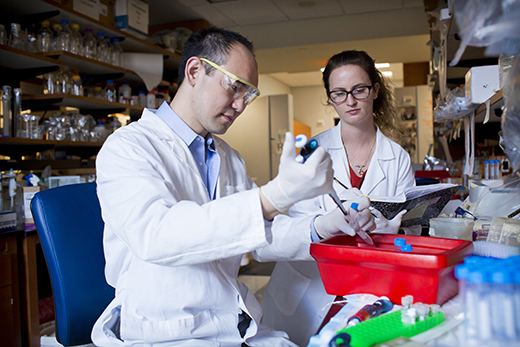Researchers at Emory University received $574.6 million from external funding agencies in fiscal year 2016. This marks the seventh consecutive year that research funding has exceeded $500 million, and with an increase from $572.4 in FY15, is the largest amount of research funding in Emory's history.
Federal agencies awarded $389.7 million, or nearly 68 percent of the total, led by the National Institutes of Health (NIH) with $333 million in awards. NIH funding represented 85 percent of total federal dollars awarded to Emory.
"We have outstanding faculty throughout the Health Sciences Center who are dedicated and passionate about conducting research that can advance discovery, improve health and save lives," says David Stephens, MD, vice president for research in Emory's Woodruff Health Sciences Center and chair of the Department of Medicine in Emory University School of Medicine. "We are proud of our continuing ability to attract research funding to continue this critical work, despite national economic challenges.”
Researchers in Emory's Woodruff Health Sciences Center (WHSC) received more than $540 million in FY16, or nearly 94 percent of the University total, with $364.9 million in federal funding, including $322.2 million from the NIH. The WHSC includes schools of medicine, public health, nursing, Yerkes National Primate Research Center, Winship Cancer Institute and Emory Healthcare.
Emory University School of Medicine received nearly $348 million, the Rollins School of Public Health received $94.8 million, Yerkes National Primate Research Center received $79.1 million and Emory College received $28.7 million in funding. Emory's Nell Hodgson Woodruff School of Nursing received $15.1 million.
“Research funding is increasingly dependent on the development of collaborative research projects that include multiple schools and departments within Emory and with external partners,” Stephens notes. “Our research proposals and our discovery results have been greatly improved by partnerships and multidisciplinary efforts.”
Examples of Emory's externally funded research projects in fiscal year 2016 include:
- $35.6 million over five years from the NIH to Emory School of Medicine and Yerkes Research Center to lead the Emory Consortium for Innovative AIDS Research in Nonhuman Primates, focused on developing new strategies for preventing and curing HIV/AIDS.
- $9.7 million in a contract from the Defense Threat Reduction Agency (DTRA) to the Emory Institute for Drug Development to develop drugs to treat infections caused by emerging and man-made viral threats, focusing initially on Eastern Equine Encephalitis Virus, Western Equine Encephalitis Virus and Venezuelan Equine Encephalitis Virus.
- $8.3 million from the NIH to Rollins School of Public Health, along with the Georgia Institute of Technology, to establish a National Exposure Assessment Laboratory. The laboratory will join a network of laboratories that will measure the impact of environmental chemicals on children's health, building on the existing HERCULES Health and Exposome Research Center.
- $8.9 million over five years from the NIH to Emory School of Medicine to better understand both the positive and negative effects of reactive oxygen species and inflammation on blood vessel function, with the aim of developing better strategies for prevention and intervention.
- $6.4 million in a contract from the Defense Advanced Research Projects Agency (DARPA) and the Army Research Laboratory (ARL) to Emory School of Medicine, Emory Vaccine Center, and Yerkes Research Center, along with collaborators at University of Georgia and Georgia Tech. The consortium will investigate the mechanisms of “resilience” following malaria infection, with the aim of developing better interventions including improved drug therapy.
- $5 million from the National Institute of Environmental Health Sciences and the U.S. Environmental Protection Agency to the Nell Hodgson Woodruff School of Nursing and Rollins School of Public Health, along with Emory College and Emory School of Medicine, to establish a children's environmental health research center.
- $5.2 million over five years from the National Institute on Aging to Emory School of Medicine, to examine the connections between blood pressure regulation and Alzheimer's disease.
- $2.8 million from the National Cancer Institute for a program project grant to extend the Winship Cancer Institute's program in Innovative Research in Cancer Nanotechnology to develop nanoparticles to treat pancreatic cancer.
- $1.7 million from the NIH BRAIN Initiative (Brain Research through Advancing Innovative Neurotechnologies) to Emory College, along with partners at Georgia Tech, to better understand neural circuitry involved in debilitating and difficultto- treat disorders like Parkinson's disease, Huntington's disease and dystonia.
- $2.4 million to Emory School of Medicine and Metaclipse Therapeutics Corp. to develop a new cancer vaccine immunotherapy targeting triple-negative breast cancer.
- $1.5 million from the NIH Office of Research on Women's Health to Emory to lead a career development program for junior investigators pursuing women's health and sex differences research. Building interdisciplinary Research Careers in Women's Health (BIRCWH) connects junior faculty to senior faculty mentors with shared research interests.
- $2.2 million from the Centers for Disease Control and Prevention to Emory School of Medicine and partners at Georgia Tech and Georgia State University for a Prevention Epicenters Program focusing on infection control and prevention research in health care facilities.
- $1.2 million from the NIH for a Science Education Partnership Award to Winship Cancer Institute and partners at Morehouse School of Medicine and Georgia Tech to create the Center for Advancing Health and Diversity through Citizen Science.
- $1 million from the National Science Foundation and the CDC to Emory College's Environmental Sciences Department to enhance Zika virus mosquito surveillance and to contain Zika virus transmission.

